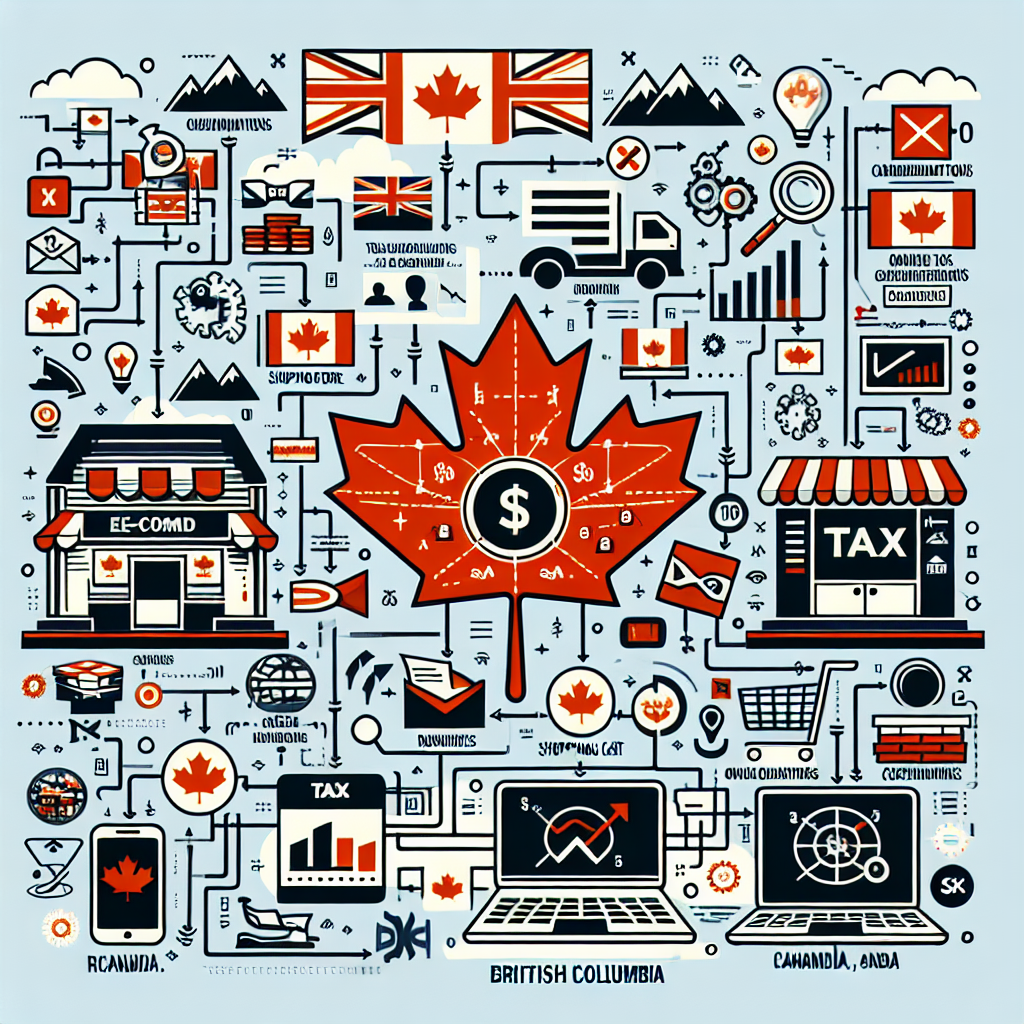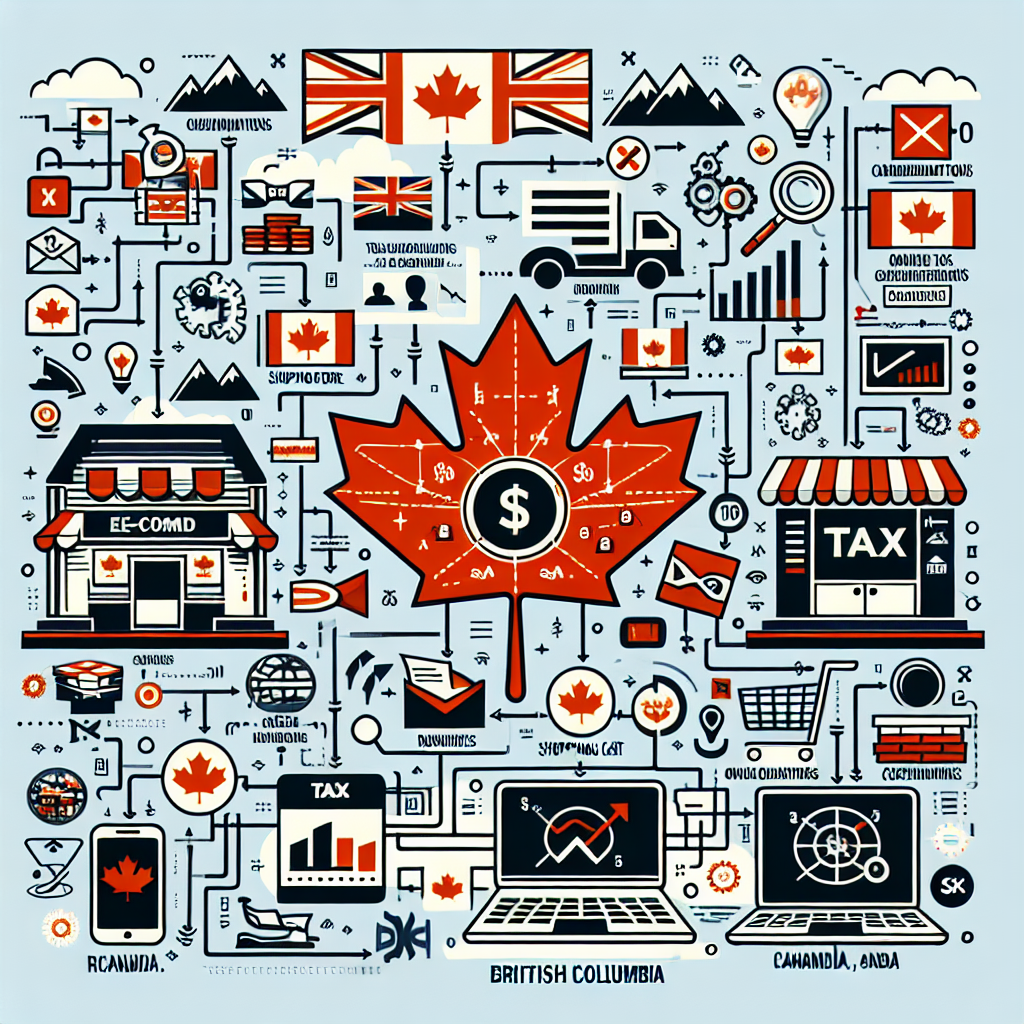So, you’ve decided to jump into the exciting world of online sales in beautiful British Columbia. But wait, before you can start raking in the dough, you need to figure out how to handle those pesky taxes. Don’t worry, we’ve got you covered. In this handy guide, we’ll walk you through everything you need to know about tax obligations and how to navigate the ins and outs of selling online in BC. From understanding your tax responsibilities to getting registered and filing returns, we’ll break it down in a way that’s easy to understand, so you can focus on what you do best – selling those awesome products!
Understanding Online Sales Tax
Overview of online sales tax
When it comes to online sales, it’s crucial to understand the concept of sales tax. Sales tax is a form of consumption tax imposed on the sale of goods and services. In the context of e-commerce, online sales tax refers to the tax obligations that online sellers have to collect and remit to the government based on their sales activity. These taxes are used to fund various government services and infrastructure projects.
Importance of collecting and remitting taxes
Collecting and remitting taxes is not just a legal requirement for online sellers; it is also essential for the overall functioning of the economy. By collecting taxes, the government can generate revenue to finance public services such as healthcare, education, and transportation. When online sellers fulfill their tax obligations, they contribute to the well-being of the community and support the growth of the economy.
Difference between federal and provincial taxes
In Canada, there are both federal and provincial levels of taxation. The federal government has its taxation system, which includes the Goods and Services Tax (GST) and the Harmonized Sales Tax (HST) for certain provinces. On the other hand, each province has its own sales tax, known as the Provincial Sales Tax (PST). Understanding the difference between these taxes is crucial for online sellers to accurately calculate and remit the correct amount of taxes.
Tax obligations for online sellers
As an online seller in BC, you have tax obligations that need to be fulfilled. These obligations include registering for a GST/HST number, collecting and remitting taxes, determining your tax nexus, keeping accurate records, and complying with reporting requirements. It is essential to familiarize yourself with these obligations to ensure you are meeting the necessary legal requirements and avoiding any penalties or fines.
Determining Your Tax Nexus
Definition of tax nexus
Tax nexus refers to the relationship between an online seller and a particular jurisdiction that determines whether the seller is subject to the jurisdiction’s tax laws. It establishes the presence or connection required for the seller to be obligated to collect and remit taxes in that jurisdiction. The concept of tax nexus becomes particularly important for online sellers as they may have customers located in multiple jurisdictions.
Factors determining tax nexus for online sales
Several factors help determine your tax nexus for online sales. The most common factor is physical presence, which includes having a physical location, employees, or inventory in a specific jurisdiction. However, with the rise of e-commerce, a new concept known as economic nexus has emerged. Economic nexus considers the level of sales activity or revenue generated within a jurisdiction as the determining factor for tax obligations. It is essential to understand the rules and thresholds set by each jurisdiction to determine your tax nexus accurately.
Impact of physical presence on tax obligations
If you have a physical presence in a specific province, such as a warehouse or office, you are generally required to collect and remit the sales tax in that jurisdiction. It is crucial to familiarize yourself with the specific tax laws of the province in which you have a physical presence to ensure compliance. Additionally, having a physical presence may also subject you to other tax obligations, such as income tax and payroll taxes, depending on the nature of your business activities.
Understanding economic nexus
In recent years, many jurisdictions have introduced economic nexus laws to address the challenges posed by e-commerce. Economic nexus laws establish tax obligations based on the level of sales or revenue generated within a jurisdiction, regardless of physical presence. This means that even if you don’t have a physical presence in a particular province, you may still be required to collect and remit sales tax if you meet the economic nexus threshold. It’s important to research and monitor the economic nexus laws of each jurisdiction in which you sell your products or services.

Registering for a GST/HST Number
Understanding the GST/HST tax system
The Goods and Services Tax (GST) and the Harmonized Sales Tax (HST) are consumption taxes applied to most goods and services sold in Canada. The GST is a federal tax collected by the Canadian Revenue Agency (CRA), while the HST combines the GST and provincial sales tax for specific provinces, including BC. As an online seller, it is essential to understand how these taxes work, their rates, and when to charge and remit them.
Who needs to register for a GST/HST number
If you are an online seller with worldwide revenues over $30,000 CAD in a calendar quarter or within four consecutive calendar quarters, you are required to register for a GST/HST number. However, even if you do not meet this threshold, you can still voluntarily register for a GST/HST number. Registering for a GST/HST number allows you to collect and remit taxes, claim input tax credits, and access various tax benefits and incentives.
Process of registering for a GST/HST number
To register for a GST/HST number, you can do so online through the CRA’s Business Registration Online (BRO) service. You will need to provide relevant information about your business, including its legal name, business structure, contact information, and anticipated annual sales. Once registered, you will receive a GST/HST number that you must use when charging and remitting taxes. It is important to keep your registration information up to date and notify the CRA of any changes in your business details.
Understanding Provincial Sales Tax (PST)
Overview of PST in BC
In British Columbia, the Provincial Sales Tax (PST) is a retail sales tax that applies to the purchase, lease, or rental of goods and certain services. The PST rate in BC is currently set at 7%. As an online seller, you are responsible for collecting and remitting PST on eligible transactions based on the location of your customer within the province.
PST exemptions and regulations
While most goods and services are subject to PST, there are certain exemptions and regulations that online sellers need to be aware of. For example, specific items such as groceries, prescription drugs, and medical supplies are exempt from PST. Additionally, certain transactions related to services provided to out-of-province customers may also be exempt. It is important to familiarize yourself with the PST regulations and exemptions to ensure accurate calculation and remittance of taxes.
Calculating and remitting PST for online sales
Calculating and remitting PST for online sales requires accurate recordkeeping and a clear understanding of the rules and regulations established by the BC government. Generally, you are required to collect PST at the time of sale based on the location of your customer within BC. The PST collected must be remitted to the BC government at regular intervals, typically monthly or quarterly. It is essential to keep thorough records of your sales, PST collected, and PST remitted to facilitate compliance with the tax regulations.

Applying Harmonized Sales Tax (HST)
Explanation of HST in BC
The Harmonized Sales Tax (HST) is a combination of the federal Goods and Services Tax (GST) and the Provincial Sales Tax (PST). It applies to certain provinces, including BC, where the GST and PST are harmonized into a single tax. The HST rate in BC is currently set at 12%. Understanding when to charge and remit HST is essential for online sellers operating in jurisdictions where the HST applies.
When to charge and remit HST
As an online seller in BC, you are required to charge and remit HST if your sales activities meet the specific criteria set by the government. If your worldwide sales exceed the annual threshold of $30,000 CAD or you voluntarily register for an HST number, you must charge and remit HST on eligible transactions. It is important to monitor your sales closely and determine whether you meet the HST obligations to comply with the tax regulations.
Calculating HST for online sales
Calculating HST for online sales involves charging the appropriate rate on eligible transactions. For example, if your customer is located in BC and the purchase is subject to HST, you would charge 12% HST on the transaction. It is crucial to accurately calculate HST and clearly communicate the taxes charged to your customers. Additionally, you must remit the HST collected to the government at regular intervals, just like other tax obligations.
Determining Taxable Products and Services
Differentiating taxable and tax-exempt products/services
In the context of online sales tax, it is important to differentiate between taxable and tax-exempt products and services. Taxable products and services are those that are subject to GST, HST, or PST, while tax-exempt products and services are not. Various factors, such as the nature of the product or service and applicable laws and regulations, determine whether something is taxable or tax-exempt. It is crucial to understand these distinctions to accurately apply the appropriate tax rates to your online sales.
Commonly exempted online sales
Certain online sales are commonly exempt from sales tax. For example, most jurisdictions consider sales of groceries, prescription drugs, and medical supplies as tax-exempt. In addition, certain services provided to customers outside the jurisdiction may also be exempt. It is important to familiarize yourself with the specific exemptions in each jurisdiction where you sell your products or services to ensure compliance with the tax laws.
Special considerations for digital products
Digital products, such as e-books, software, and online courses, present unique challenges when it comes to determining their taxability. Different jurisdictions have different rules regarding the taxation of digital products. Some jurisdictions consider them taxable, while others may provide exemptions or impose specific rules. It is crucial to research and understand the tax laws in each jurisdiction to accurately determine the tax obligations for your digital products.
Collecting and Remitting Taxes
Methods of collecting taxes from customers
As an online seller, there are various methods you can use to collect taxes from your customers. One common method is to include the applicable taxes in the sales price, while another method is to show the tax amount separately during the checkout process. Additionally, you can use online payment platforms that automatically calculate and add the tax amount to the total. Whichever method you choose, it is crucial to clearly communicate the taxes charged to your customers to ensure transparency and compliance.
Setting up tax collection systems
Setting up an efficient tax collection system is important to accurately and seamlessly collect taxes from your online sales. This involves integrating tax calculation software that calculates the correct tax rates based on the customer’s location and the applicable tax rules. This way, you can ensure that the correct amount of taxes is collected upfront during the checkout process. It is crucial to test and validate your tax collection system periodically to ensure accuracy and compliance.
Calculating and remitting taxes to the government
Calculating and remitting taxes to the government involves the proper organization and documentation of your sales and taxes collected. It is important to keep accurate records of your sales transactions, including the dates, amounts, and applicable tax rates. By calculating the total tax amount collected, you can easily determine the amount to be remitted to the appropriate tax authority. Timely remittance of taxes is crucial to avoid penalties and late fees. It is recommended to set up a system that facilitates regular tax remittance based on the tax obligations of your jurisdiction.
Recordkeeping and Reporting
Importance of maintaining accurate records
Maintaining accurate records is crucial for both legal compliance and effective business management. Proper recordkeeping allows you to have a clear overview of your sales, taxes collected, and taxes remitted. By keeping accurate records, you can easily respond to tax authorities’ inquiries and demonstrate compliance in case of an audit. In addition, accurate records provide valuable insights into your business’s financial health and help you make informed decisions to drive growth.
Types of records to keep for tax purposes
For tax purposes, it is important to keep detailed and organized records related to your online sales. This includes sales transactions, invoices or receipts issued to customers, records of taxes collected, and records of taxes remitted to the government. It is also advisable to keep track of any exemptions or special circumstances that may impact your tax obligations. By maintaining these records, you can easily fulfill your tax reporting requirements and ensure compliance with the tax laws.
Reporting requirements for online sellers
As an online seller, you have reporting requirements to fulfill regarding your sales and tax obligations. This typically involves submitting periodic sales tax returns to the appropriate tax authorities. The frequency and complexity of reporting may vary depending on your jurisdiction and the specific tax obligations you have. It is important to familiarize yourself with the reporting requirements of your jurisdiction, including deadlines and any additional documentation that may be required.
Navigating Cross-Border Sales
Understanding tax implications of selling outside BC
When selling outside British Columbia, the tax implications can become more complex due to different tax rules and regulations. Jurisdictions outside BC may have their own sales tax systems or apply different rates and exemptions. It is crucial to research and understand the tax laws of each jurisdiction where you sell your products or services to accurately determine your tax obligations and ensure compliance.
International tax obligations for online sellers
Selling internationally introduces additional tax obligations for online sellers. In addition to the tax obligations in your home jurisdiction, you may also have to consider the tax laws of the countries where your customers are located. Some countries require foreign sellers to register for local tax purposes, collect and remit sales tax, or comply with other tax-related regulations. It is important to conduct thorough research and seek professional advice to navigate the complexities of international tax obligations.
Importance of researching foreign tax laws
Researching foreign tax laws is crucial to ensure compliance when selling internationally. Each country may have its own tax regulations, rates, exemptions, and reporting requirements. It is advisable to consult with tax professionals or seek guidance from the tax authorities in the respective countries to accurately determine your tax obligations. By understanding the foreign tax laws, you can avoid potential legal issues and ensure that you are fulfilling your tax obligations in the jurisdictions where you sell your products or services.
Seeking Professional Assistance
When to consider consulting a tax professional
Handling taxes for online sales can be complex, especially when dealing with multiple jurisdictions, different tax rules, and evolving regulations. If you find yourself struggling to understand and navigate the various tax obligations, it may be beneficial to consider consulting a tax professional. Tax professionals specialize in tax matters and can provide valuable guidance, ensure compliance, and help optimize your tax strategy. Whether it’s registering for a GST/HST number, understanding tax nexus, or calculating taxes, a tax professional can assist you throughout the process.
Benefits of hiring a tax accountant
Hiring a tax accountant can provide numerous benefits for online sellers. A tax accountant possesses expert knowledge of tax laws, regulations, and compliance requirements. They can help you accurately determine your tax obligations, ensure proper recordkeeping, and optimize your tax strategy to minimize your tax liability. Additionally, a tax accountant can assist you during tax audits, answer your tax-related questions, and keep you updated on any changes in the tax laws that may impact your business.
Finding the right tax professional
Finding the right tax professional for your online business is crucial to receive accurate and reliable advice. Start by considering the qualifications and experience of the tax professional. Look for Certified Public Accountants (CPAs) or Chartered Professional Accountants (CPAs) specializing in taxation. Additionally, consider their familiarity with online sales tax regulations and their experience in serving clients in your industry. Seeking referrals from other business owners or conducting online research can also help you find a reputable tax professional who can effectively assist you with your specific tax needs.
Navigating the world of online sales tax in British Columbia can be a complex and challenging task. However, by understanding the fundamentals, complying with tax obligations, and seeking professional assistance when needed, you can manage your taxes effectively and ensure the ongoing success of your online business. Remember, accurate recordkeeping, proper tax collection systems, and regular remittance of taxes are the key pillars of a successful tax strategy. Stay informed, stay compliant, and stay focused on growing your business while fulfilling your tax obligations.

